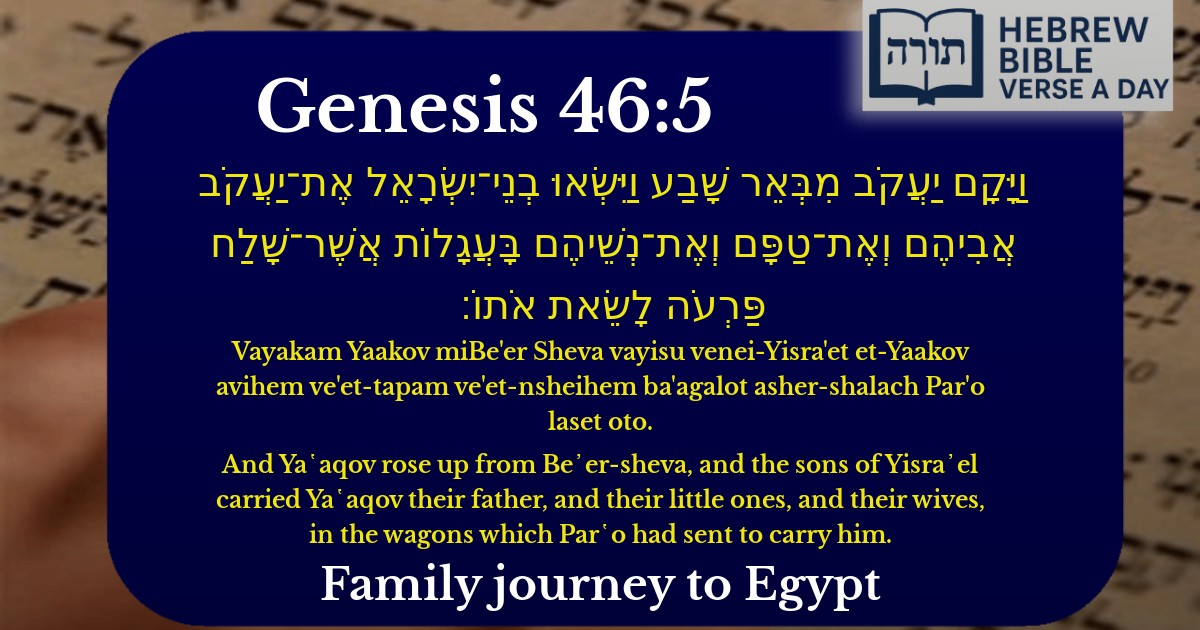Join Our Newsletter To Be Informed When New Videos Are Posted
Join the thousands of fellow Studends who rely on our videos to learn how to read the bible in Hebrew for free!
Hebrew Text
וַיָּקָם יַעֲקֹב מִבְּאֵר שָׁבַע וַיִּשְׂאוּ בְנֵי־יִשְׂרָאֵל אֶת־יַעֲקֹב אֲבִיהֶם וְאֶת־טַפָּם וְאֶת־נְשֵׁיהֶם בָּעֲגָלוֹת אֲשֶׁר־שָׁלַח פַּרְעֹה לָשֵׂאת אֹתוֹ׃
English Translation
And Ya῾aqov rose up from Be᾽er-sheva, and the sons of Yisra᾽el carried Ya῾aqov their father, and their little ones, and their wives, in the wagons which Par῾o had sent to carry him.
Transliteration
Vayakam Yaakov miBe'er Sheva vayisu venei-Yisra'et et-Yaakov avihem ve'et-tapam ve'et-nsheihem ba'agalot asher-shalach Par'o laset oto.
Hebrew Leining Text
וַיָּ֥קׇם יַעֲקֹ֖ב מִבְּאֵ֣ר שָׁ֑בַע וַיִּשְׂא֨וּ בְנֵֽי־יִשְׂרָאֵ֜ל אֶת־יַעֲקֹ֣ב אֲבִיהֶ֗ם וְאֶת־טַפָּם֙ וְאֶת־נְשֵׁיהֶ֔ם בָּעֲגָל֕וֹת אֲשֶׁר־שָׁלַ֥ח פַּרְעֹ֖ה לָשֵׂ֥את אֹתֽוֹ׃
וַיָּ֥קׇם יַעֲקֹ֖ב מִבְּאֵ֣ר שָׁ֑בַע וַיִּשְׂא֨וּ בְנֵֽי־יִשְׂרָאֵ֜ל אֶת־יַעֲקֹ֣ב אֲבִיהֶ֗ם וְאֶת־טַפָּם֙ וְאֶת־נְשֵׁיהֶ֔ם בָּעֲגָל֕וֹת אֲשֶׁר־שָׁלַ֥ח פַּרְעֹ֖ה לָשֵׂ֥את אֹתֽוֹ׃
🎵 Listen to leining
Parasha Commentary
📚 Talmud Citations
This verse is not quoted in the Talmud.


Yaakov's Departure from Be'er Sheva
The verse describes Yaakov's departure from Be'er Sheva to Egypt, accompanied by his family. Rashi (on Bereishit 45:27) explains that Be'er Sheva was a place of deep spiritual significance for Yaakov, as it was where his father Yitzchak had established a covenant with Avimelech (Bereishit 26:33). Leaving this holy place marked a significant transition for Yaakov and the future of Bnei Yisrael.
The Role of Pharaoh's Wagons
The wagons sent by Pharaoh hold symbolic meaning. The Midrash (Bereishit Rabbah 94:3) teaches that these wagons (agalot) were a sign from Yosef to Yaakov, alluding to the last Torah topic they had studied together—the egla arufa (the decapitated calf, Devarim 21:1-9). This was Yosef's way of proving his identity and reassuring Yaakov that he was alive. Ramban (on Bereishit 45:27) adds that this gesture demonstrated Yosef's continued commitment to Torah despite his high position in Egypt.
The Order of the Family's Travel
Spiritual Significance of the Journey
The Or HaChaim (on Bereishit 46:1) notes that Yaakov's descent to Egypt was divinely ordained, as Hashem had foretold to Avraham (Bereishit 15:13). Despite the challenges of exile, this journey set the stage for the eventual redemption and receiving of the Torah at Har Sinai. The wagons symbolize both physical transport and the divine providence guiding Bnei Yisrael into exile for a greater purpose.